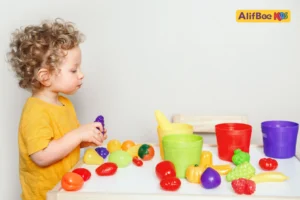Before the internet or online Quran classes for kids, the only way to teach children the Quran was by sending them to traditional Islamic centers or hiring a home tutor if available. However, in many parts of the world, expert tutors and Islamic centers were not readily accessible, which made learning the Quran difficult for many children.
Today, with technology and the internet, online Quran learning for kids has become increasingly common—and for all the right reasons. Children can now connect with native Arabic speakers from the comfort of their homes, making learning Quran for kids more accessible to families everywhere.
In this article, we’ll cover practical steps, tools, Tajweed, and tips to help you, as a parent, guide your kids in learning the Quran with ease.
Why Learning the Quran Early Matters for Children
According to a study published by the National Institutes of Health, listening to, reciting, or memorizing the Holy Quran has a positive effect on reducing depression and anxiety and improving the overall quality of life.
While there is no set age for learning the Quran, Islamic scholars highly recommend starting Quran education for children at a young age, between 3 and 7 years old.
As a parent, you might wonder why that is the case and why your child cannot learn the Quran when they are a bit older. The reason is that Quranic education offers various benefits, including spiritual and emotional growth, as well as improved cognitive and memory functions.
Spiritual and Emotional Growth
The Quran is the word of Allah, offering a wealth of guidance. When your child starts learning the Quran at a young age, their spiritual foundation becomes strong, enabling them to reflect on their actions, develop compassion for others, and establish a strong moral compass.
With a strong spiritual foundation, children are better equipped to handle stress and emotional challenges such as anxiety and sadness.
At What Age Does Learning a New Language Start to Be More Difficult, and Why?
According to research, learning a new language becomes more challenging between the ages of 7 and 13. Although adults may still pick up new languages, the process is slower. hard, mainly because of two changes in the brain:
- Decreased Neuroplasticity: The brain’s ability to adapt decreases as it develops. More fixed neural connections cause the brain to concentrate more on the native tongue. Neural connections are more fixed; therefore, it focuses more on the native language. This slows down the brain’s ability to create new, fresh rules and sound classifications needed for a different language, such as Arabic.
- Increased Cognitive Filtering: Adult language learners often study and comprehend the new language primarily using their existing native language.
Reliance on translation and a tendency to produce new sounds using the rules of the native tongue and accent can hinder those learning late in life. This filter is less burdensome for a child’s brain, allowing them to learn the Arabic language as a standalone system.
Cognitive and Memory Benefits
Memorization and Quran learning for kids improve memory, build problem-solving skills, and enhance overall cognitive function. Reading and memorizing verses require focus, mental presence, and determination. When your child tries to memorize a verse, their brain engages in a cognitive process that strengthens both short- and long-term memory.
Building a Lifelong Love for the Quran
A child’s mind is like a sponge—it absorbs whatever is given to it. Before their mind absorbs things that may be harmful or unbeneficial, it’s important to fill their heart with the love of Allah and Islam.
Early exposure to the Quran through daily recitation, memorization, and even listening at a young age builds a deep love for Islam in their heart. In many cases, children even compete with one another to see who has the best recitation.
However, as a parent, it’s best to keep Quran learning fun and positive. Teaching the Quran to a child requires patience. Some days, your child may throw tantrums to skip their online class, but it’s important to motivate them through positive gestures, such as rewarding them with a small treat when they attend the class.
The Core Elements of Quran Learning for Kids
The Quran is the only book in the world that can be memorized verse by verse and page by page. However, before diving into how to teach the Quran to kids, there are certain components you need to understand.
Reading the Quran
The first and foremost step is reading the Quran. If you’re non-Arab, you might need to spend more time and effort teaching your child how to read it. There are various resources available online, such as Noorani Qaida, that can help your child learn to read the Quran correctly.
Tajweed Rules Made Easy for Children
After learning how to read, the next component is Tajweed (تَجْوِيد). In simple Arabic, Tajweed means “betterment.” In other words, it refers to the art of beautifying the recitation of the Quran.
Tajweed includes a set of rules that ensure every letter is pronounced and recited correctly. Kids often struggle with Tajweed, especially if they don’t come from an Arabic-speaking background. However, you can teach Tajweed to your child more easily through rhymes or visual tools. With the internet and access to online learning platforms, Quran teaching for children has become much easier.
Hifz (Memorization) Strategies for Young Learners
Once your child can read the Quran with proper Tajweed, the next step is Hifz (memorization). Memorizing the Quran requires focus, time, and discipline. The first step is to set a fixed routine where your child spends at least 30 minutes learning the Quran every day.
Start by assigning small portions, depending on how much your child can memorize within that time. Some children memorize quickly, while others take longer — and that’s perfectly normal. The most effective way to memorize the Quran is by breaking it into small sections, then into individual verses. Memorize one verse at a time. Keep repeating each verse until it is fully memorized, and once mastered, move on to the next.
After your child has memorized all the verses in the assigned section, ask them to recite them to you. If they forget a verse, have them look at it and recite again from the beginning. Keep repeating the process until they can recite all the assigned verses fluently and without mistakes.
As a parent, you will often have to supervise your child during the learning sessions, ensuring they’re not distracted. You can also use visual aids, such as writing and displaying verses on whiteboards or prominent places where your child can easily look and read.
Understanding the Meanings (Tafseer & Simple Translation)
The Quran is full of lessons that we can apply in our daily lives. When teaching online quran for kids, it’s the best opportunity for parents to teach their children about Islam.
You can talk about the stories behind different surahs, such as Surah Al-Alaq, which contains the story of the first revelation to Prophet Muhammad (Peace and Blessings Be Upon Him) in the cave of Hira.
The same Surah also talks about the importance of learning, which begins with the command to “Read” in the name of Allah. When your child understands the meaning behind the verses, they are more likely to remember those verses and apply them to their daily life.
How to Learn Quran Online for Kids — Step by Step
Muslim parents around the world are often worried about their kids. They want to teach and learn Quran online for kids, but they don’t know where to start. If you’re in the same boat and want your child to learn and memorize the Quran, here’s what you can do.
Choosing the Right Online Quran Platform for Kids
First things first, choose the online Quran platform for your kid. However, when picking the right online Quran learning platform for your kids, firstly, inquire about the teacher’s qualifications. A qualified teacher can maintain quality in their tutoring and help your child learn more quickly.
You may also want to discuss the settings of the online class. Some children are quick to learn and focus, and thus, they can do well in group classes. However, some children require extra attention, making 1-on-1 classes a more suitable option. Apart from the teacher’s qualifications and online class settings, you may also need to consider:
- Flexible schedules
- Experience and competency of teachers
- Educational methodology
- Reviews and ratings
Flexible Scheduling for Learning Online Quran for kids
Traditionally, sessions of Quran learning for kids were long, over one or two hours every day. But with smart scheduling and routine planning, a small but consistent 20 to 30 minutes a day is adequate to learn Quran online for kids, especially small children.
For children between the ages of 3 and 7, an easy Quran memorization plan would work great, which goes as follows:
- Goal: 2-3 lines per day.
- Daily: 15-20 minutes for new memorization and 10 minutes for review.
- Weekly: One day dedicated solely to reviewing and revising the week’s verses.
Tracking Progress and Setting Realistic Goals
Learning and memorizing the Quran is a journey that can take years to complete. On average, it takes anywhere from one to five years to memorize the entire Quran. Throughout this journey, it’s best to monitor your child’s progress to evaluate their abilities and identify areas that may need more attention, such as reading fluency and verse memorization.
Once you begin tracking progress, you can set realistic goals for your child’s Quran learning. Start by assigning small surahs to memorize and gradually increase the number of verses according to their ability. Track how long it takes them to complete each surah using a spreadsheet or a printable progress tracker.
The Parents’ Role in Quran Teaching for Children
Parents make many sacrifices to raise their children as righteous and devout Muslims. Their role in online Quran teaching for children cannot be overstated. As a parent, you may need to step out of your comfort zone to ensure your child attends their online sessions—starting with creating a distraction-free space without toys or electronic devices in sight.
Throughout the day, you can play beautiful Quranic recitations to inspire your child to learn. On days when your child feels cranky or reluctant to take an online class, speak to them patiently and encourage them to attend. You can also sit beside your child and revise the Quran together, which helps motivate them and strengthens your family bond.
Allah sees the struggle of every parent and has promised rewards for their efforts. According to a Hadith reported by Mua’dh Al-Juhani (Radhiyallahu Anhu):
Mua’dh Al-Juhani (Radhiyallahu Anhu) narrates that Nabi (ﷺ) is reported to have mentioned: “If anyone recites the Qur’an and acts according to its content, on the Day of Judgement his parents will be given to wear a crown whose light is better than the light of the sun in the houses of this world if it were among you. So what do you think of him who acts according to it? (Abu Dawud)
عنْ سَهْلِ بْنِ مُعَاذٍ الْجُهَنِيِّ، عَنْ أَبِيهِ، أَنَّ رَسُولَ اللَّهِ صلى الله عليه وسلم قَالَ
” مَنْ قَرَأَ الْقُرْآنَ وَعَمِلَ بِمَا فِيهِ أُلْبِسَ وَالِدَاهُ تَاجًا يَوْمَ الْقِيَامَةِ ضَوْؤُهُ أَحْسَنُ مِنْ ضَوْءِ الشَّمْسِ فِي بُيُوتِ الدُّنْيَا لَوْ كَانَتْ فِيكُمْ فَمَا ظَنُّكُمْ بِالَّذِي عَمِلَ بِهَذَا”
12-Week Roadmap to Learn Quran Online for Kids
It takes a realistic roadmap to effectively learn the Quran online for kids. For a child who’s just starting, a 12-week beginner-friendly roadmap will be an ideal plan for them.
Weeks
Instructions
1-4
Learn Arabic Letters and Short Surahs
5-8
Start Tajweed and Memorize Short Chapters
9-12
Improve Fluency and Begin Understanding
Weeks 1–4: Learn Arabic Letters and Short Surahs
In the first few weeks, when your child is new to Arabic letters, the main focus should be on letter recognition. Introduce them to Noorani Qaida, a beginner-level textbook that teaches the Arabic alphabet and pronunciation, setting the foundation for your child’s learning.
Once they are able to recognize Arabic letters, move on to learning short surahs such as Al-Ikhlas and Al-Asr. In the first four weeks, you don’t need to conduct long sessions—10 to 15 minutes of daily practice is sufficient.
Weeks 5–8: Start Tajweed and Memorize Short Chapters
From the fifth week onward, you can introduce your child to basic Tajweed concepts, such as where to pause, where to elongate, and how to recite words with Noon Sakinah and Tanween. During this phase, set a goal of memorizing one to two ayahs every day.
Weeks 9–12: Improve Fluency and Begin Understanding
In the final three weeks of the 12-week roadmap, ensure your child can read short surahs fluently with proper Tajweed. During this stage, start explaining the meanings and translations of different verses, as well as the stories behind the short surahs, to help them understand and draw inspiration from the Quran. Once your child has mastered the basics of recitation and can read smoothly, you can begin planning the next 12-week roadmap.
Final word
Memorizing the Holy Quran is a great blessing from Allah, granted only to those He chooses. Only the fortunate are able to memorize the Quran completely, from cover to cover.
As a parent who is passionate about helping their child become a Hafiz, you don’t need to send them to a Quranic center when expert Quran tutors are easily accessible online. However, to ensure effective Quran learning for kids, you must put in consistent effort to help your child maintain a regular study routine.
That’s why many scholars recommend starting Quran education as early as three years old, when the child’s mind is fresh, developing, and free from distractions. At that age, they are more likely to complete the Quran sooner than those who start later.





